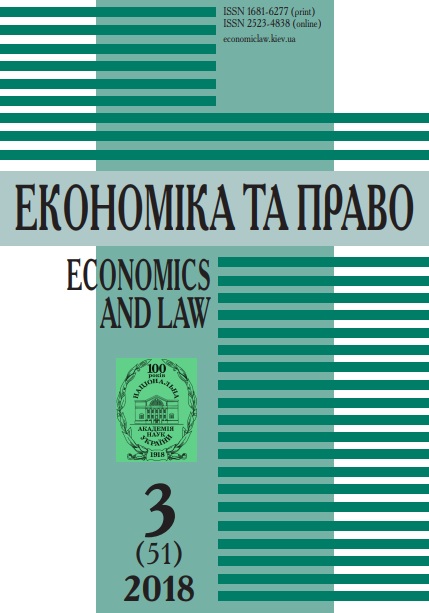MOTIVATION AS FUNDAMENTAL COMPONENT OF ENTERPRISE MANAGEMENT
DOI:
https://doi.org/10.15407/econlaw.2018.03.080Keywords:
personnel, labor efficiency, urge, material and non-material stimulation, motivator, motivational policyAbstract
The high level of competition encourages managers of different size organizations by the type of business and economic direction to resort to non-standard measures of an enterprise management in order to consolidate its position on the market. Since one of the main sources of increased profitability is a more efficient work of employees, then, regardless of the strategy of the enterprise, management will encourage the staff to more effectively use of this resource. The most effective means of stimulation is motivation. For today, the types of motivation are the subject of discussion for many scholars. In general, you can distinguish three main types of motivation as material, conditional- material and intangible, and the main factors that motivate people to work. The survey of managers and employees of enterprises of Ukraine showed that the most effective kind is material one, in particular, through wages, in the second and third placesthere is intangible and conditionally material ones, respectively. During the performance of the motivation function, managers face a variety of problems. So during a material incentive, the manager faces the problem of opacity of the wage system, the different levels of wages of employees in related positions, the change in the level of remuneration in line with the growth of the minimum wage, and not based on, for example, the price index and others. One of the main causes of ineffective non-material motivation is the poor policy of career growth and the lack of an atmosphere in which every employee could use all his potential opportunities. Problems with the use of conditional material incentives are mainly due to the lack of social benefits at enterprises. Solving these and other motivational issues is out lined in the article.
References
Travin V.V., Magura M.I., Kurbatova M.B. Motivacionnyj menedzhment: Modul’ III: Ucheb.-praktich. posobie. Moskow: Delo, 2005. 96 p. [in Russian].
Shapiro S.A. Motivacija i stimulirovanie personala. Moskow: GrossMedia, 2005. 224 p. [in Russian].
Sladkevich V.P. Motivacionnyj menedzhment: Kurs lekcij. Kiev: MAUP, 2001. 168 p. [in Russian].
Khodykina I.V. Motyvatsiia, rozvytok personalu ta stvorennia korporatyvnoi kultury — zaporuka efektyvnoho upravlinnia personalom kompanii ta uspishnoi diialnosti kompanii. Visnyk Kamianets-Podilskoho natsionalnoho universytetu imeni Ivana Ohiienka. Ekonomichni nauky. 2015. Iss. 10. P. 341-348 [in Ukrainian].
Bazaliiska N.P., Mishchuk V.V. Sutnisni pidkhody formuvannia systemy motyvatsii trudovoi povedinky pratsivnykiv na pidpryiemstvi. Ekonomika ta upravlinnia pidpryiemstvamy. 2016. No. 9. P. 232-236 [in Ukrainian].
Rezul’taty oprosa: denezhnye pooshhrenija — samyj jeffektivnyj sposob motivacii personala. 14.03.2013. URL: http://www.work.ua/news/ukraine/490/ [in Russian].
Bala V.V., Matsak A.H. Protses motyvatsii personalu pidpryiemstva ta yoho skladovi. Tekhnolohichnyi audyt ta rezervy vyrobnytstva. 2014. No. 3/3(17). P. 46-50 [in Ukrainian].
Zbrytska T.P. Motyvatsiia yak mekhanizm pidvyshchennia efektyvnosti diialnosti personalu. Hlobalni ta natsionalni problemy ekonomiky. 2014. No. 2. P. 942-947 [in Ukrainian].
Shylnikova Z.M. Osoblyvosti motyvuvannia personalu v suchasnykh umovakh hospodariuvannia. Hlobalni ta natsionalni problemy ekonomiky. 2014. No. 2. P. 774-777 [in Ukrainian].
Chervinska L.P. Do pytannia motyvatsii personalu. Ekonomist. 2014. P. 109-113 [in Ukrainian].


